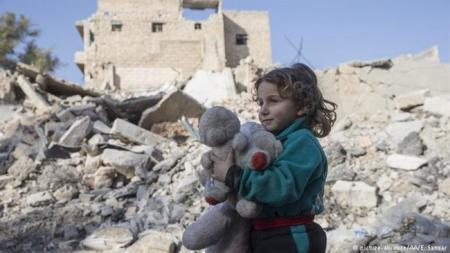
There have been major efforts to improve child welfare around the world over the past two decades. But despite progress, millions of children still face massive challenges caused by factors outside of their control, dw.com wrote.
According to a new UNICEF report, one in 12 of the world's 2.2 billion children has far bleaker prospects today than the previous generation did 20 years ago.
One in 12 children worldwide live in countries where they face far bleaker prospects than 20 years ago, according to a UNICEF report released to coincide with World Children's Day.
According to the analysis, a drop in quality of life was clear in 37 countries, and driven by factors such as conflict, financial crises and poor governance.
Laurence Chandy, UNICEF director of data, research and policy, said, "While the last generation has seen vast, unprecedented gains in living standards for most of the world's children, the fact that a forgotten minority of children have been excluded from this — through no fault of their own or those of their families — is a travesty.”
The UNICEF analysis looked at children's chances of escaping extreme poverty, accessing education and avoiding violent death. South Sudan, which has been plagued by civil war, was the only country where children fared worse than the previous generation in all three categories.
Violent deaths among children below the age of 19 climbed in seven countries, including the Central African Republic, Libya, Syria, Ukraine and Yemen — all hit by major conflicts. A drop in primary school enrolment was recorded in more than 20 countries, including Syria and Tanzania, while extreme poverty increased in 14 countries.
According to the International Labor Organization (ILO), agriculture is where the worst and most common forms of child labor are found. Coffee plantations employ children to pick beans in Colombia, Tanzania, Kenya, Uganda, Mexico, Nicaragua, Dominican Republic, Honduras, Panama, El Salvador, Guinea, and Ivory Coast.
A separate UNICEF survey of 11,000 children in 14 countries found that children were deeply concerned about global issues such as terrorism, climate change, poverty and unfair treatment of refugees and migrants.
Children in South Africa and the UK reported feeling most disenfranchised, with 73 percent and 71 percent respectively saying that their voices are not heard. Children in India, meanwhile, felt the most empowered.
According to the survey, children across all 14 countries were concerned about terrorism and poor education. However, children in Turkey (81 percent) and Egypt (75 percent) were worried about terrorism affecting them personally. Children in the Netherlands were the least concerned. Respondents in Brazil, Nigeria, and Mexico were the most troubled about violence affecting children.
